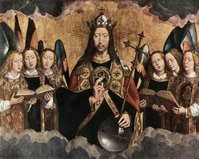 Liturgy of the Word:
Liturgy of the Word: 1 Samuel 2:1-10Psalm 16Hebrews 10:11-25Mark 12:38-13:8Collect (BCP):
1 Samuel 2:1-10Psalm 16Hebrews 10:11-25Mark 12:38-13:8Collect (BCP):Blessed Lord, who caused all holy Scriptures to be written for our learning: Grant us so to hear them, read, mark, learn, and inwardly digest them, that we may embrace and ever hold fast the blessed hope of everlasting life, which you have given us in our Savior Jesus Christ; who lives and reigns with you and the Holy Spirit, one God, for ever and ever. Amen.
Symbols of God's Glory
Our Bibles are printed either in verse format or paragraph format.
If you have the King James verson, the text is grouped in chapters and verses, each one numbered and set apart from each other one as though each was a complete thought, separate from the verses around it.
If you have a more modern translation, the translators have tried to gather the text into paragraphs that better reflect the organization of the ideas being presented. But the paragraph organization is placed upon the text by men other than the writer, who have interpreted the text to determine where they ought to go.
But even these are still divided at the chapter numbers as though what is written in one chapter abruptly stops and a new thought takes up in the next chapter.
This is certainly how the crafters of the Revised Common Lectionary selected their scripture passages for a given Sunday.
But this is not how the Old Testament and the New Testament writers wrote their text. In fact, the early texts were written in all caps with no punctuation and no breaks or spaces between words. A reader who was familiar with the language could mentally separate the words by the word endings and the sentences were separated by understanding the context of what was being said.
Stephen Langton is reputed to have been the first to put the chapter divisions into a Vulgate edition of the Bible, in 1205. They were then inserted into Greek manuscripts of the New Testament in the 1400s. Robert Estienne (Robert Stephanus) was the first to number the verses within each chapter, his verse numbers entering printed editions of the New Testament in 1565 and in the Old Testament in 1571.
When these conventions were introduced in to the Bible, they were done so – not to divide the thoughts into paragraphs and sentences – but to provide refrence points for locating particular passages of scripture, like coordinates on a map helps to locate specific places on the map.
Last Sunday's Gospel stopped at Mark Chapter 12, verse 44 and the Gospel prescribed for today begins at Mark Chapter 13, verse 1. But the two passages are artifically separated into chapter and verse. The conversation Jesus had with his disciples in the Temple that day, that Mark is writing about, began in Chapter 12, verse 38, but does not conclude until Chapter 13, verse 2, and the passage from verse 3 to verse 8, while being a later conversation, picks up on the previous conversation.
So, let us read again the passage and try to understand what truth Jesus is teaching his disciples.
Jesus begins by giving a warning about certain men, the scribes. Who were these men? Do they have their counterparts in our society today? And if they do, should we take heed of the lesson Jesus is teaching?
The scribes were men of importance. They were men of high rank in the Temple structure. They wore fine clothes designed in the way of religious and clerical garments of the day. They were officiants, officers, of the Temple who taught the lessons, preached the sermons, and ran the business of the Temple, collecting the Temple Tax and selling the trinkets and animals for sacrifice.
But it is not their position or their duties that Jesus objects to. It is their attitude, the way they conducted themselves, their air of superiority, and their lack of compassion that Jesus objected to.
Mark 12:38-40
Beware of the scribes, who like to walk around in long robes, and to be greeted with respect in the marketplaces, and to have the best seats in the synagogues and places of honor at banquets! They devour widows' houses and for the sake of appearance say long prayers.
This last sentence tells us two things about the scribes: in the background, when they cannot be seen,
"they devour widows houses," and in public view,
"they say long prayers."Then Jesus gives the disciples an example. It is said that a picture is worth a thousand words and Jesus was giving his pupils an object lesson.
Mark 12:41-44
He sat down opposite the treasury, and watched the crowd putting money into the treasury. Many rich people put in large sums. A poor widow came and put in two small copper coins, which are worth a penny. Then he called his disciples and said to them, "Truly I tell you, this poor widow has put in more than all those who are contributing to the treasury. For all of them have contributed out of their abundance; but she out of her poverty has put in everything she had, all she had to live on."
Notice that he does not say,
"she out of her devotion to God has put in everything she had, therefore go and do likewise." This is not a lesson about stewardship or tithing or giving to the church. It's about mean, unscrupulous men conscripting the Temple tax from everyone, even from those who could not pay.
And for what?
The Temple tax was levied on the Jews to provide income for the priests and to maintain the various religious buildings and furnishings in and around the temple.
Buildings need maintenance or they will fall down. Men and women who work for the church must be paid.
Then the disciples call his attention to the greatness of the building. Here, I am afraid that I, too, fall into this trap of seeing the grandeur of a building as an expression of the love of God in the architect and the builder.
Mark 13:1
One of his disciples said to h im, “Look, Teacher, what large stones and what large buildings!”
In Chartres, France, there stands the finest example of Gothic architecture in the world, the cathedral of Notre Dame de chartres. It's patron was the bishop of Chartres, St. Bernard of Clairvaux. St. Bernard was best remembered for his many great sermons, the building of this great cathedral under his leadership and the founding of one of the bloodiest of all the crusades. And it was the booty brought back by the Knights Templar that funded the construction of this great cathedral.
Mark 13:2
Then Jesus asked him, "Do you see these great buildings? Not one stone will be left here upon another; all will be thrown down."
Was Jesus predicting the destruction of the Temple that occurred 40 years later? Perhaps. But I think, more than that, Jesus was saying to the disciples that stone buildings do not make a monument to God, only good lives. Only lives devoted to loving God and loving one's neighbor are the true monuments to God.
Buildings throughout history have been built and destroyed. Even the great pyramids of Egypt have been stripped of their outer skins which were used in the building of later structures that have also fallen down. The muslim mosque that sits on Mout Zion today is built on the foundation of this great Temple that the disciples were admiring.
Jesus' point here is not to suggest that God's people must never have buildings in which to meet.
The earliest Christian communities in Jerusalem met in the Temple courts, after all, and the first-century, Christians' houses around the Mediterranean provided not only places to meet, but places to house those whose choice to follow Jesus meant that their families tossed them out on the street.
That sharing of resources in which none have too much and all have enough is what makes a place holy to the Lord. For the Lord cares for the stranger and sustains the orphan and the widow, not any number of impressive vestments, eloquent prayers, or gorgeous examples of architecture.
When the Letter to the Hebrews speaks of "a sanctuary made by human hands," in contrast to the true one, it does so as a critique of religious and political establishments, that assume a belief that the defense of any piece of ground, the maintenance of any building or institution, or the observance of any ceremony could ever justify making more widows and orphans or failing to care for those already among us.
I believe the message that God is calling us to proclaim, about stewardship, is that every day is stewardship day, a day to remember "who made heaven and earth, the seas, and all that is in them," and to whom all those things and all they produce belong. They belong to God, their creator.
Every day is a day to remember that freely offering back to God all His gifts to give justice to those who are oppressed and food to those who hunger, freedom to the prisoners and sight to the blind.
Every day is a day to remember, and to act in remembrance of God's grace to us, most especially in sending us Jesus, that those bent down by the world's troubles may be empowered to walk tall.
It is our love of God and our love for our fellows and the compassion we have for them, more than any building or any ceremony, that glorifies God. And when we participate in that process, that mission of God in the world, we come closest to seeing God's glory on earth.
Psalm 51:15
O Lord, open my lips,
and my mouth will declare your praise.
For you have no delight in sacrifice;
if I were to give a burnt-offering,
you would not be pleased.
The sacrifice acceptable to God is a broken spirit;
a broken and contrite heart,
O God, you will not despise.
Thanks be to God!
Let us pray,Deliver us, Lord, from every evil
and grant us full trust in your future.
Do not allow us to delay your plans.
Do not let us grow bitter or skeptical
when your promise of harmony and justice
take time to become a reality,
but keep alive in us the dream
that weak people can carry out your plans,
as we wait in joyful hope
for the coming in glory
of our Lord and Savior Jesus Christ.
For the Kingdom, the power,
and the glory are yours,
both now and forevermore.
Amen.
Closing Prayer & BlessingNumbers 6:22-26
And the LORD spoke unto Moses, saying,
Speak unto Aaron and unto his sons, saying,
In this manner you shall bless the children of Israel,
saying unto them...
The LORD bless thee, and keep thee:
The LORD make his face shine upon thee,
and be gracious unto thee:
The LORD lift up his countenance upon thee,
and give thee peace.








